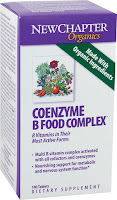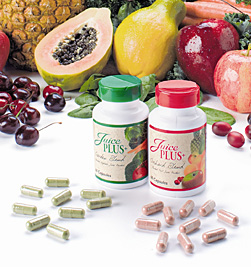 |
| Garden of Life B Complex |
- B1 (Thiamine) - Used for neural function (brain), liver protection, nerve health, vascular health and kidney health in diabetics.
- B2 (Riboflavin) - Boosts folic acid's (B9) colorectal cancer protective effect (hence why B complex is necessary...they all work together synergistically), increases iron absorption and regulates red blood cell growth, memory, depression, healthy hair, nails, skin and vision. It also has some antioxidant capacity and is sometimes used as a natural yellow colorant in foods and cosmetics.
- B3 (Niacin) - Increases HDL (good) cholesterol and lowers LDL (bad) cholesterol and triglycerides, and is critically important for cardiovascular health. It aids in brain repair after a stroke. Niacinamide is known for treating fungal infections, fetal alcohol syndrome and may have a role in easing discomfort for multiple sclerosis by preventing NAD depletion.
- B5 (Pantothenic Acid) - Known to be involved as a coenzyme A precursor, it is also vital for metabolism and energy production in the body. Derivatives panthenol and pantethine are important for skin and hair health as well as helping to optimize a person's lipid profile (sound familiar? Pantene Pro-V tries to mimic this vitamin for their shampoos and conditioner).
- B6 (Pyridoxine) - In combination with folic acid and B12, it helps reduce homocysteine in the blood, which as implications for heart and brain health. Can also protect against colorectal and lung cancer, especially for smokers. B6 helps optimize nervous system health and can treat neuropathy and carpal tunnel syndrome.
- B7 (Biotin) - This vitamin is necessary for cell growth, the production of fatty acids, and the metabolism of fats and amino acids. not only assists in various metabolic reactions but also helps to transfer carbon dioxide. Biotin may also be helpful in maintaining a steady blood sugar level. This is the most popular vitamin for strengthening hair and nails and helping with skin. (I take this =p)
- B9 (Folic Acid or Folate) - This is critical in reducing homocysteine in the blood (in combo with B6 and B12), a major risk in heart disease and stroke. It prevents neural tube birth defects in developing infants in utero, which is why it's recommended all women whether pregnant or in their child-bearing years take this important B vitamin. Usually 800mcg is the recommended dosage (also found in prenatals). It has been shown to improve vascular function and blood pressure in young women.
- B12 (Cynocobalamin or Methylcobalamin) - Useful in homocysteine reduction through its ability to convert folic acid to it's more active form (methylcobalamin) known to treat anemia in the elderly. It helps metabolize fats and carbs and is especially important in optimizing nerve health. Vegetarians have special needs to supplement B12 because their diets are naturally deficient in this critical nutrient. Most importantly, B12 is known best as the energy vitamin. It helps energize the cells and gives individuals that boost they need during the day. On a side note: methylcobalamin is the form I recommend because it is the active form and more readily available and ready to absorb.
I'm really biased with which vitamins I use because I only want the best. The two companies that truly do organic fruits, vegetables and herbs in all of their formulas are Garden of Life and New Chapter (the two images shown above). Each vitamin comes from the mentioned sources. They do not isolate the vitamins and they are definitely not synthetic (which is what you find in most vitamins). The other company worth mentioning cannot be found in stores, it is JuicePlus+ (shown below). They have all fruits and vegetables in their products.



















































